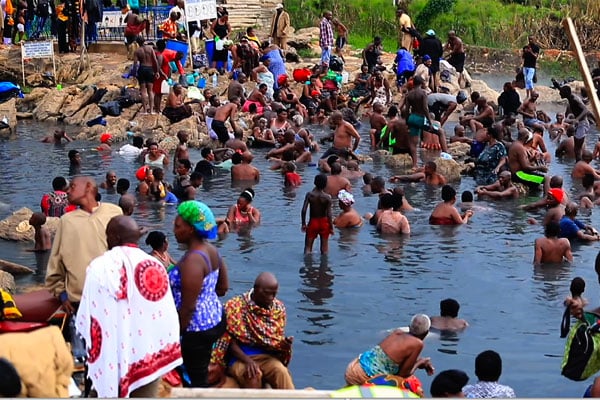Prime
Clinging onto Bujagali’s fading glory

Since the falls downstream at Bujagali were flooded leaving only a flat water stream not conducive for rafting, many tourists no longer visit the area thinking there is nothing left to see. COURTESY PHOTO
What you need to know:
The construction of a hydroelectric power station at Namizzi from 2007 to 2012 meant that the falls downstream at Bujagali were flooded leaving only a flat water stream not conducive for rafting. This reduced the number of tourists, writes Makhtum Muziransa.
A deafening silence greets you as you approach the once raging Bujagali falls. Even the once jolly birds seem to have ceased to sing.
It is in this setting that Adam Bangi must earn his daily bread. Every morning he wakes up with the hope that a lone tourist perhaps would want to know what is left of the Bujagali Falls after a dam was constructed here in 2012. Unfortunately, not many tour Bujagali anymore.
“I wait here every day for anyone who might want to take a boat ride on the Nile or view Bujagali’s cave, it is the only way we can make money,” Bangi, who is stout in build and spots brown dreadlocks, says as his friends gather around us one by one. “Life was much easier when we had the falls because we would entertain tourists. Many of them came to see the boys that would swim through the falls and we did that for Shs10,000-15,000 per trip. “Nowadays, we can spend a week without making Shs10,000. People have lost interest in this place but there is still a lot to see,” he insists.
Insecurity
Unfortunately, this reduction in business has according to Julius Caesar Mpata, increased the insecurity in the place while the flooding of the former river banks has increased the prevalence of malaria and bilharzia in the area. Mpata is an administrator at Soft Power Health Clinic, one that does community outreach programmes to sensitise masses about their medical needs.
“Despite the sensitisation, many of our people got excited during the compensation period and that is why they are suffering. “The Salini Impregilo (the lead contractors of the project) people that compensated them worked with Standard Chartered Bank to educate our people on financial management. Those who were riding bicycles as a means of life were advised to buy motorcycles while taxi conductors were advised to buy their own.”
The idea was that they stick to the same businesses they were used to. But some went into buying bigger vehicles to transport building materials and the like. The situation got complicated and most of them are left with nothing.
“That has increased theft; we have one break-in after another. They have not spared homes or cars,” says Mpata, a school dropout before Dr. Jessie Stone, the proprietor of Soft Power Health Clinic, sent him back to school in 2010 and employed him at the clinic in 2011.
Other attractions
A closer look at the place also shows that the rafting and kayaking companies that turned into big businesses here still hold forte.
Juma Kalikwani, a river manager at Nile River Explorers, a rafting company, insists that they are determined to make the most of what is left at the Nile because of its advantages over other rafting spots on the continent.
“Rafting is common on River Nile, Tana in Kenya and Zambezi in Zambia. But the Nile has a historical treat to it if you read the story of Moses in the Bible. “Most importantly it is not in a gauge like River Zambezi so it is safe. You can easily walk on either side of the river in case a client gets an accident and its waters are warm throughout the year,” Kalikwani shares.
Since the white water sport started in 1996, Kalikwani who grew up in Itanda, has been heavily involved and has grown through the ranks; from a mere guide to now a manager of rafters. “It is true that tourists came to this country even before we started rafting but white water gave us an edge. Now it is gone and those numbers are likely to go down,” he regrets. “But as the numbers go down, remember that rafting companies have camp sites around Bujagali or Isimba, where the other dam is nearing completion,” Kalikwani told us when we visited his company’s new offices on Wilson Road, Jinja. “We agree that the good days are gone but look at this building, it was constructed last year. Our bosses believe there is still something we can make out of the Nile.
Holding on
There has been a new attempt to compensate these rafting and kayaking companies or even the rafters so we can completely leave but why should we? As rafting guides, we have been asked to form an association that will make a case for our compensation.
But our employers need to first declare that they are closing shop before we are compensated. They cannot because they believe that when Isimba is completed, there will be three more rapids that can be utilised.
Actually, they are negotiating with the government to see if they can utilise the flat water for bungee jumping, high diving and skiing. So it is a bit contradictory for the guides to ask for compensation while the companies push for new activities. After all, the companies will still employ these guides for the new activities.”
The Power Station
The Bujagali Power Station is a hydroelectric power station across the Victoria Nile that harnesses the energy of its namesake – the Bujagali Falls. Construction began in 2007 and concluded in 2012. It was officially inaugurated on October 8, 2012, by President Yoweri Museveni. The capacity of the power station is 250 megawatts (340,000 hp).




